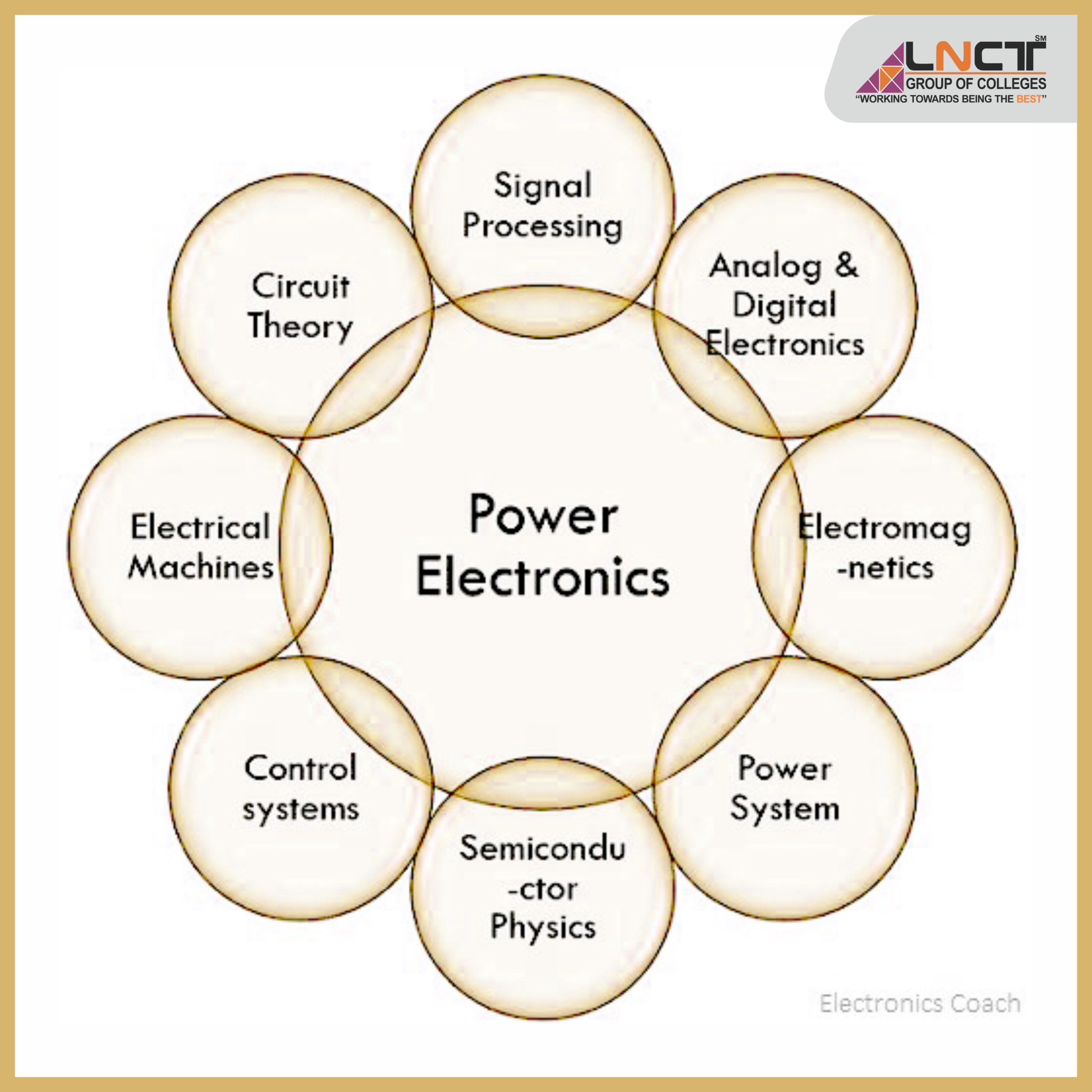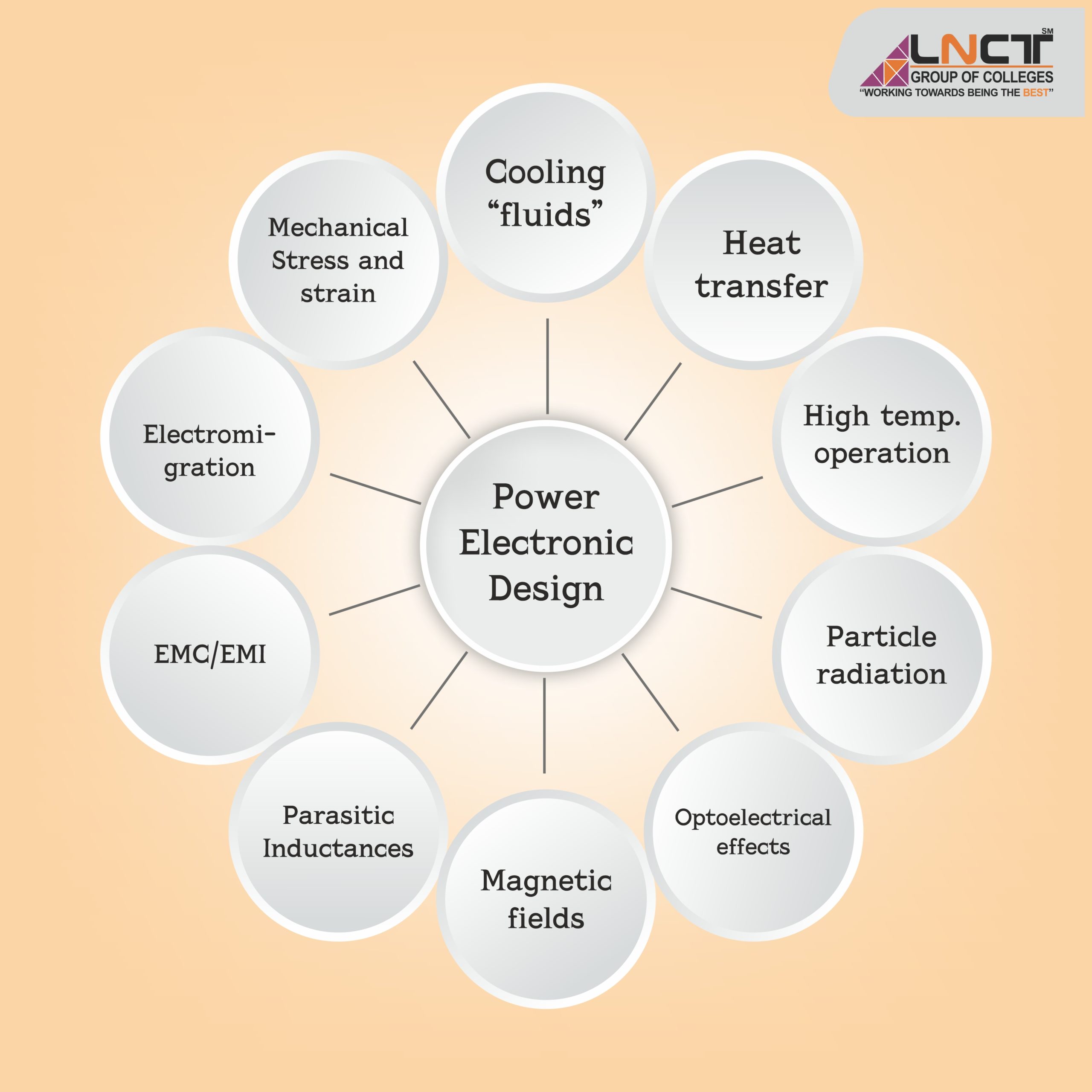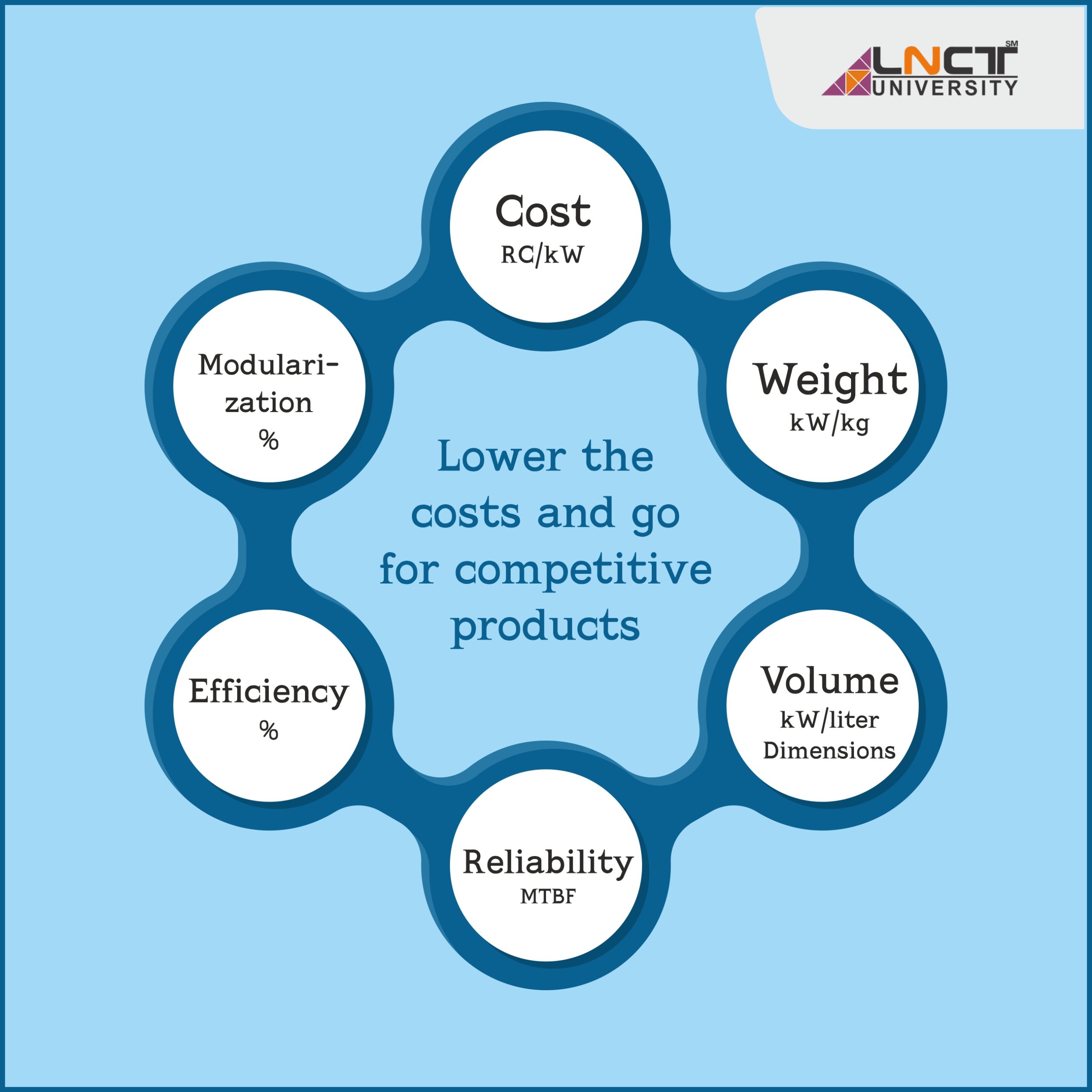A detailed overview of Power Electronics
In this article, we will talk about the process of MTech Power Electronics admission 2021, Fees Structure, Best Colleges to study Mtech, which will be explained briefly.
What is Power Electronics?

Power electronics is the application of solid-state electronics to the control and conversion of electric power.
The first high power electronic devices were made mercury-arc valves. In modern systems, the conversion is performed with semiconductor switching devices such as diodes, thyristors, and power transistors such as the power MOSFET and IGBT. In contrast to electronic systems concerned with transmission and processing of signals and data, in power electronics substantial amounts of electrical energy are processed. An AC/DC converter (rectifier) is the most typical power electronics device found in many consumer electronic devices, e.g. television sets, personal computers, battery chargers, etc.
The power range is typically from tens of watts to several hundred watts. In industry, a common application is the variable speed drive (VSD) and the power range of VSDs starts from a few hundred watts and ends at tens of megawatts.
Power electronics refers to a versatile field in the boundary of electrical engineering. Its key feature is to deal with the crafting, control & conversion of power in its electrical form. A technology that transforms electric energy into an electric load with the help of a control circuit is called Power Electronic System.
Power electronics is well known to be broad and a very complicated subject with sophisticated & modern technology & also cost-effective through the spectrum of brand discoveries. Its functions are quite authentic & are enlarging in several areas such as industrial, commercial, residential, military, & aerospace applications.
Concept of Power Electronics
The field of electrical engineering is mainly categorized into three categories:
- Electronics
- Power
- Control
Power electronics is well known to be broad as well as very complicated subject that has sophisticated & modern technology & also cost effective through the spectrum of brand new discoveries. Its functions are quite authentic & are enlarging in several areas such as industrial, commercial, residential, military, & aerospace applications.
The block diagram is given below. It clearly showcases the components of a Power Electronic System & how they are connected.
A power electronic system transforms electrical energy from one form to another & make sure the below mentioned is accomplished-
- Maximum efficiency
- Maximum reliability
- Maximum availability
- Quick response
- Lower Cost
- Least weight
- Reduce size
Limitations of Power Electronics
The following are the limitations of Power Electronics are given below:
- Less overload capacity
- Harmonics are generated
- Very expensive
Applications of Power Electronics

There are multiple uses of power electronics in several technological areas such as industrial automation, energy generation, & conversion, environmental pollution control, etc. Its core applications are mentioned below:
- Industries:
During the chemical processing instruments, welding, lighting, electroplating, pumps, & compressors, induction heating boiler, conveyors, cranes, electromagnets, electric vehicles & furnaces, etc.
- Home Appliances:
Refrigerators, vacuum cleaners, micro oven, washing machines, grinders, air conditioning, room heaters, etc.
- Commercial:
Smart phones, computers, electric fans, vending machines, power banks, etc.
- Medical:
Various medical equipment’s, & machines, fitness & test machines, etc.
- Automotive & Security systems:
Electric vehicles, regulators, alarms, etc.
- Aerospace :
Satellite systems, aircraft, & space vehicles, spaceship power systems, etc.
- Transportation :
Motor drives, trains trollies & subways, locomotives, streetcars, elevators, magnetic levitation, etc.
- Telecommunication:
DC power supply, UPS, wireless communication transmitters, & receivers, etc.
- Power systems:
Static circuit breakers, thyristor controlled reactors, energy storage systems, harmonics suppression, etc.
Here, you have to keep in mind that the major emergence of power electronics in terms of utilization depends on its capability of saving electricity of electrical framework. We are very well aware of today’s world that is proceeding towards the utilization of energy for the welfare of humans in household works & industrial requirements.
Usually, the majority of the energy is accomplished by burning fossil fuels that constantly causing global warming. Hence, the application of Power Electronics in electrical network is beneficial in the contraction & in this way we can increase efficiency.
It is also showcase that the approximation shows that throughout 15% of the consumption of electricity can be deducted with the use of power electronics.
- Renewable Energy
It uses power semiconductor devices to perform switching action in order to achieve a desired conversion strategy. The PE plays crucial role of conversion and control electrical power. Therefore, PE based power converters are also widely used in renewable energy systems.
- Electric Vehicles
In electric cars, power electronic is responsible for converting and controlling electric power in system. Some of the major power electronic components and functionalities are used in electric vehicle system. These include inverter, converter, and on-board charger. Operations at high voltage or high current can be efficiently executed by utilizing power electronic devices, as they deliver a faster switching rate at higher efficiency. In addition, power electronics control both unidirectional as well as bidirectional flow of energy, depending on the usage, and the regenerated energy can be sent back to utility.

Difference between MTech in Power electronics & MTech in Electrical Power Engineering
Mtech Power Electronics and MTech in Electrical Power Engineering are almost similar courses, but with some of the core differences.
The elementary differences between these two courses are as follows:
| Qualification | Master of Technology in Power Electronics | Masters of Technology in Electrical Power Engineering |
| Course Details | M.Tech in Power Electronics is generally a 2-year full time professional course in the methodology regulation of Power Electronics. | Masters of Technology in Electrical Power Engineering is an Electrical Engineering course with the specialism in Power Electronics |
| Eligibility Criteria | Complete graduation | Complete graduation |
| Admission Procedure | Entrance examination | Entrance examination |
| Average Fee | ₹1,00,000 to ₹ 5,00,000 | ₹ 56,000 to ₹ 2,50,000 |
| Average Annual Salary | ₹ 4,00,000 to ₹ 20,00,000 | ₹ 3,00,000 to ₹ 9,00,000 |
| Colleges | LNCT Group of Colleges | Bharat Institute of Engineering and Technology, Amity School of Engineering and Technology, VIT |
| Recruitment Centres | Research and Development Center, Design and manufacturing firms, Discoms, Power supplier, Energy generation etc. | Research and Development Center, Design and manufacturing firms, Discoms, Power supplier, Energy generation etc. |
| Top Job Prospectives | Grade II Technician, Engineer Trainee, Senior Management Staff, Regulatory Officer, Engineering Executive, Junior Engineer, Power Electronics, Drives Engineer etc. | Transmission engineer, Supply manager, Discom in charge, Power engineer, Design engineer, Researcher etc. |
Boost your career with the help of Power Electronics
In the present scenario, there is extreme shortage of high skilled manpower in various industries that’s why high skilled power electronics engineers are very high in demand.
India’s power invention ability is on a peak to more than double in the upcoming years. The country more concentrates on the power industry to carry on with the growth path, there are ample interesting opportunities awaiting you in the sphere of Power Electronics.
“The total installed power generation capacity, including from renewable energy sources, in the country as on February 28, 2021 is 379.1 GW. A total of 117.9 GW power generation capacity has been added during the last five years and current year (up to February 28, 2021), from conventional and renewable energy sources.” Power is considered as among those industries which grasp assurance as well as promises for growth & inflation. The most important factor for the accelerated development of the economy is that power has a synchronization an ultimatum as well as fortuity for the complete energy value chain in India.
Steps to get admission to a top-notch MTech Power Electronics College?
To get a reserved seat in a renowned college for MTech Power Electronics, the important points are mentioned below:
- Perform appropriate research about immense no of colleges in the location & select the perfect college accordingly
- Try to connect with passing students of the particular college on social media to acquire knowledge about the fees structure & placement
- Regularly visit the official website of the college and strictly follow the admission process
- Receive adequate knowledge in the respective subject
Empowering the power sector is a primary aim in the present plan duration needs thriving participation of all stakeholders. You can become an integral part of the nation-building story by get your foot in the power field. This field will provide you enormous scope and opportunities.
Power electronics has a very high prospective as it has switched from a bare IT product to energize the entire sector along with other industries, for instance photo machines.
Relationship of Power Electronics with other Disciplines
Power electronics considered as one of the most vital spheres of electric power engineering & clearly shows its relationship with several other disciplines such as semiconductor physics, circuit theory, analog, & digital electronics. In addition to these, analog & digital control systems, electromagnets & electrical machines, etc.
With the emergence of modern methodological advancements in semiconductor physics, electronic devices & circuits in parallel to control theory, the application of power electronics in several areas has developed.
Mtech admission 2021 Eligibility Criteria for M. Tech in Power Electronics
For General Category
| Qualification required | Minimum qualifying marks |
| Graduation in B.E/B.Tech | 50% |
| GATE | N/A |
For OBC CATEGORY
| Qualification required | Minimum qualifying marks |
| Graduation in B.E/B.Tech | 45% |
| GATE | N/A |
For SC CATEGORY
| Qualification required | Minimum qualifying marks |
| Graduation in B.E/B.Tech | 45% |
| GATE | N/A |
For ST Category
| Qualification required | Minimum qualifying marks |
| Graduation in B.E/B.Tech | 45% |
| GATE | N/A |
Admission Process
Admissions are strictly done on the basis of fulfilling the eligibility criteria of a candidate. The detailed admission procedure is discussed below:
- Make sure to keep in mind the important dates such as registration & examination data from the website portal of the university.
- Keep checking for the entrance examination form on the college website of the examination
- Fill the form with accurate details & attach the necessary documents for completion
- Then submit the examination registration form & eligibility criteria for the admissions
- The next step is to get yourself registered on the college portal & submit your entrance examination score
- See the merit list according to the entrance examination score and make sure about the cut off for the selection process.
- After holding a place in the merit list, must prepare for the personal interview round & get a seat in a recognized college.
| Recognition | AICTE Approved |
| Affiliated To | RGPV-Rajiv Gandhi Proudyogki Vishwavidyalaya |
| Duration | 2 years (Full Time) |
| Course Level | PG Degree |
| Total seating arrangement | 30 seats |
| Website | https://lnct.ac.in/lnct-excellence-college/ |
Detailed description about the MTech Power Electronics
Mtech Power Electronics is an exciting and among the most sought course which can be discussed as:
-
- MTech in Power Electronics is a 2-year full time professional course in the interdisciplinary field of Power Electronics.
- It is a complete industry-based course program that involves the area of Electrical Engineering & gain appropriate knowledge about analysis, build, implement, & about the working of machines
- Mtech Power Electronics is a study program that is all about microprocessors & microcontrollers, & its performance in the Power Electronics Engineering field
- The full course of Mtech Power Electronics depends on practical applications of executing a power converter system
- Aspiring candidates who want to study further in Power Electronics can pursue PhD in the same field after completing Mtech course.
Course Curriculum of MTech in Power Electronics Engineering
Semester wise course curriculum followed by the majority of the colleges are mentioned as follows:
| Semester-I | Semester-II |
| Electric Drive System | Modelling and Analysis of Electrical Machines |
| Digital Signal Processing | CAD of Electrical Apparatus |
| Power Electronic Devices and Circuits | Control of Electric Drives |
| Numerical Method and Optimization Techniques | Analysis of Power Electronic Controllers |
| Advanced Electrical Machines | Minor Project |
| Electrical Machines (Elective – I) | High Voltage DC Transmission (HVDC) (Elective-II) |
| Modern Control Theory (Elective – I) | Power Quality (Elective-II) |
| Cyber Security | Mechatronics Systems (Elective – II) |
| – | Multi-Level Inverters for High-Power Induction Motor Drives (Elective–II) |
| – | Communication Skills for Engineers |
| – | Research Methodology |
| Semester-III | Semester-IV |
| Major Project: Part – I | Major Project: Part – II |
| Practical Training | – |
Top recruiting Placement Companies
- Adobe
- AIS
- Amazon.com
- CapGemini
- Cognizant
- Directi
- Indian Navy
- Infogain
- Infosys
- Newgen
- Orange
- Persistent
- Samsung
- Tata Projects
- TCS
- TRIVENI
- WIPRO
- Xoriant
- Yash Technology
- Zensar Technologies
- Zycus
How to become a high skilled Power Electronics Engineer in 2021?
To become a successful power electronics engineer requires 5 years engineering degree in electronics from a recognized university. It is mandatory to have a minimum of one previous work experience in the power engineering area.
It is a very crucial job role that is ideal for those candidates who prefer to put forward personal touch to various technology assignments. Furthermore, they love to create electronic boards, despite the following various stages of its progressive cycle.
Besides this, it is also endorsed that they must have strong interpersonal skills, aware of how to determine team spirit & diligence.
Mandatory Skill Sets required for Power Electronics Engineer
First & foremost they require CAD tools ( for eg: Spice, Saber) & schematic tools ( for eg: Cadence). They must know to modify the product’s logistics, which can periodically fascinate altering it for space & heat issues.
Furthermore, they must know the EMC (electromagnetic compatibility) ethics & also knowledgeable with the instructions of the electrical network that strengthens the board. They should have electrical approval (ELSYS Design provides it to its engineers after a purposeful training).
Ultimately, being capable of confirming a professional experience in an implanted domain like space, military, aeronautics, etc.
Job Positions for Power Electronics Engineers
A highly skilled professional Power Electronics Engineers generally holds the following job positions given below:
- Grade II Technician
- Engineer Trainee
- Senior Management Staff
- Regulatory Officer
- Engineering Executive
- Junior Engineer
- Power Electronics
- Drives Engineer, etc.
Responsibilities & Duties of a Power Engineer
The profession of power electronics engineering is technically very vast. This job role perhaps involves various electronic boards that require, based on the technology they use, various levels of voltages & currents.
However, it can be said that these engineers specialize in:
- Evaluates specifications
- Suggest appropriate interpretation planning to meet the requirements.
- Works on several electronic designs (schematics), component classification, & theoretical inspection to research the structure of the pathetic cases & hence take into account all the possibilities of anxiety observed by the ingredient (stress tests)
- Design schematics on CAD software
- Understands the placement & pattern
- Convey the design to the production team, collects blueprint on which he runs accurate test ideas he noted
- Diagnose electronic boards and delivers them
Salary of a professional Power Engineer
The average salary for a professional power engineer in India is around ₹ 4,00,000 to ₹ 20,00,000 per annum according to knowledge, skill & expertise.
Conclusion:
This article provides a detailed overview of the Power Electronics Engineering course curriculum, eligibility, admission procedure, job prospects & a lot of pieces of other stuff. With the help of this write up you will capable of uncover so many facts that you didn’t know before. Power Electronics refers to the procedure of controlling the flow of electricity & voltage & transforming it to a form that is perfect for user loads.
The Ministry of Power is constantly driving for ‘Power for All by 2012’. The total installed power generation capacity, including from renewable energy sources, in the country as on February 28, 2021 is 379.1 GW.
A total of 117.9 GW power generation capacity has been added during the last five years and current year (up to February 28, 2021), from conventional and renewable energy sources.. Power is considered as among those industries which grasp assurance as well as promises for growth & inflation.
The most important factor for the accelerated development of the economy is that power has a synchronization an ultimatum as well as fortuity for the complete energy value chain in India.


